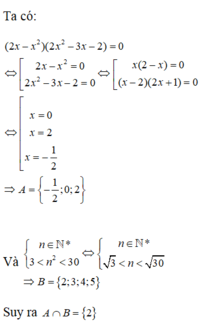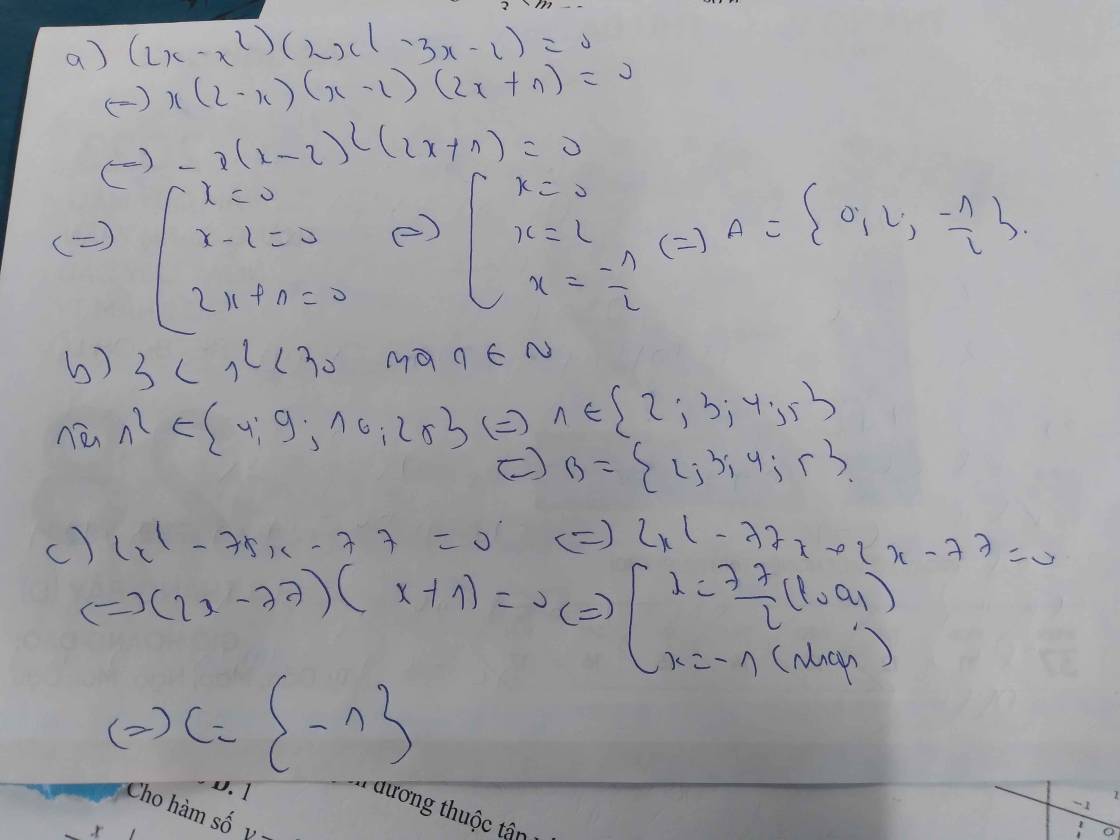Cho 2 tập hợp A = {x € R/(2x - x2)(2x2 - 3x -2) = 0}, B = {n € N/3<n2<30}, chọn mệnh đề đúng?

Những câu hỏi liên quan
giúp mk vs m.n, HELP ME! THANK YOU.Câu 1/ Cho hai tập hợp A {x ∈ R | (2x - x2)(2x2 - 3x -) 0} và B {x ∈ R | (2x2 + x)(3x - 12m) 0}. Với giá trị nào của m thì A B?Câu 2/ Cho các tập hợp A [1 ; +∞), B {x ∈ R | x2 + 1 0} và C (0;4). Tập (A hợp B) giao C. Có bao nhiêu phần tử số nguyên.Câu 3/ Cho hai tập hợp A (m-1 ; 5], B (3; 2020 - 5m) và A, B khác rỗng. Có bao nhiêu giá trị nguyên của m để A B ∅
Đọc tiếp
giúp mk vs m.n, HELP ME! THANK YOU.
Câu 1/ Cho hai tập hợp A = {x ∈ R | (2x - x2)(2x2 - 3x -) = 0} và B = {x ∈ R | (2x2 + x)(3x - 12m) = 0}. Với giá trị nào của m thì A = B?
Câu 2/ Cho các tập hợp A = [1 ; +∞), B = {x ∈ R | x2 + 1 = 0} và C = (0;4). Tập (A hợp B) giao C. Có bao nhiêu phần tử số nguyên.
Câu 3/ Cho hai tập hợp A= (m-1 ; 5], B = (3; 2020 - 5m) và A, B khác rỗng. Có bao nhiêu giá trị nguyên của m để A \ B = ∅
Câu 2:
\(\left(A\cup B\right)\cap C=A\cap C=[1;+\infty)\cap\left(0;4\right)=[1;4)\)
Tập này có 3 phần tử nguyên
Đúng 0
Bình luận (0)
Cho hai tập
A
x
∈
ℝ
(
2
x
−
x
2
)
(
2
x
2
−
3...
Đọc tiếp
Cho hai tập A = x ∈ ℝ ( 2 x − x 2 ) ( 2 x 2 − 3 x − 2 ) = 0 và B = n ∈ ℕ * 3 < n 2 < 30 . Tìm A ∩ B .
A. A ∩ B = 2 ; 4
B. A ∩ B = 2
C. A ∩ B = 4 ; 5
D. A ∩ B = 3
Viết mỗi tập hợp sau bằng cách liệt kê các phần tử
a) A= {x ∈ R | (2x – x2)( 3x – 2) = 0}
b, B = { x∈ Z | 2x3-3x2-5x = 0 }
c , C= { x ∈ Z | 2x2 -75x -77 = 0 }
d , D = { x ∈ R | (x2 - x - 2 ) (x2 - 9 ) = 0 } .
`#3107.101107`
a,
\(\text{A = }\left\{x\in R\text{ | }\left(2x-x^2\right)\left(3x-2\right)=0\right\}\)
`<=> (2x - x^2)(3x - 2) = 0`
`<=>`\(\left[{}\begin{matrix}2x-x^2=0\\3x-2=0\end{matrix}\right.\)
`<=>`\(\left[{}\begin{matrix}x\left(2-x\right)=0\\3x=2\end{matrix}\right.\)
`<=>`\(\left[{}\begin{matrix}x=0\\2-x=0\\x=\dfrac{2}{3}\end{matrix}\right.\)
`<=>`\(\left[{}\begin{matrix}x=0\\x=2\\x=\dfrac{2}{3}\end{matrix}\right.\)
Vậy, `A = {0; 2; 2/3}`
b,
\(\text{B = }\left\{x\in R\text{ | }2x^3-3x^2-5x=0\right\}\)
`<=> 2x^3 - 3x^2 - 5x = 0`
`<=> x(2x^2 - 3x - 5) = 0`
`<=>`\(\left[{}\begin{matrix}x=0\\2x^2-3x-5=0\end{matrix}\right.\)
`<=>`\(\left[{}\begin{matrix}x=0\\2x^2-2x+5x-5=0\end{matrix}\right.\)
`<=>`\(\left[{}\begin{matrix}x=0\\\left(2x^2-2x\right)+\left(5x-5\right)=0\end{matrix}\right.\)
`<=>`\(\left[{}\begin{matrix}x=0\\2x\left(x-1\right)+5\left(x-1\right)=0\end{matrix}\right.\)
`<=>`\(\left[{}\begin{matrix}x=0\\\left(2x+5\right)\left(x-1\right)=0\end{matrix}\right.\)
`<=>`\(\left[{}\begin{matrix}x=0\\2x+5=0\\x-1=0\end{matrix}\right.\)
`<=>`\(\left[{}\begin{matrix}x=0\\x=-\dfrac{5}{2}\\x=1\end{matrix}\right.\)
Vậy, `B = {-5/2; 0; 1}.`
Đúng 3
Bình luận (0)
c,
\(\text{C = }\left\{x\in Z\text{ | }2x^2-75x-77=0\right\}\)
`<=> 2x^2 - 75x - 77 = 0`
`<=> 2x^2 - 2x + 77x - 77 = 0`
`<=> (2x^2 - 2x) + (77x - 77) = 0`
`<=> 2x(x - 1) + 77(x - 1) = 0`
`<=> (2x + 77)(x - 1) = 0`
`<=>`\(\left[{}\begin{matrix}2x+77=0\\x-1=0\end{matrix}\right.\)
`<=>`\(\left[{}\begin{matrix}2x=-77\\x=1\end{matrix}\right.\)
`<=>`\(\left[{}\begin{matrix}x=-\dfrac{77}{2}\\x=1\end{matrix}\right.\)
Vậy, `C = {-77/2; 1}`
d,
\(\text{D = }\left\{x\in R\text{ | }\left(x^2-x-2\right)\left(x^2-9\right)=0\right\}\)
`<=> (x^2 - x - 2)(x^2 - 9) = 0`
`<=>`\(\left[{}\begin{matrix}x^2-x-2=0\\x^2-9=0\end{matrix}\right.\)
`<=>`\(\left[{}\begin{matrix}x^2+x-2x-2=0\\x^2=9\end{matrix}\right.\)
`<=>`\(\left[{}\begin{matrix}\left(x^2+x\right)-\left(2x+2\right)=0\\x^2=\left(\pm3\right)^2\end{matrix}\right.\)
`<=>`\(\left[{}\begin{matrix}x\left(x+1\right)-2\left(x+1\right)=0\\x=\pm3\end{matrix}\right.\)
`<=>`\(\left[{}\begin{matrix}\left(x-2\right)\left(x+1\right)=0\\x=\pm3\end{matrix}\right.\)
`<=>`\(\left[{}\begin{matrix}x-2=0\\x+1=0\\x=\pm3\end{matrix}\right.\)
`<=>`\(\left[{}\begin{matrix}x=2\\x=-1\\x=\pm3\end{matrix}\right.\)
Vậy, `D = {-1; -3; 2; 3}.`
Đúng 2
Bình luận (0)
Viết mỗi tập hợp sau bằng cách liệt kê các phần tử của nó
a) A={x ∈ R|(2x2 - 5x + 3)(x2 - 4x + 3)= 0}.
b) B={x ∈ R|(x2 - 10x + 21)(x3 - x)= 0}.
c) C={x ∈ N|x + 3 < 4 + 2x; 5x - 3 < 4x - 1}.
d) D={x ∈ Z||x + 2| ≤ 3}.
e)E={x ∈ R|x2 + x + 3 = 0}.
a) Ta có: (2x2 - 5x + 3)(x2 - 4x + 3) = 0
=> \(\orbr{\begin{cases}2x^2-5x+3=0\\x^2-4x+3=0\end{cases}}\)
=> \(\orbr{\begin{cases}2x^2-2x-3x+3=0\\x^2-3x-x+3=0\end{cases}}\)
=> \(\orbr{\begin{cases}2x\left(x-1\right)-3\left(x-1\right)=0\\x\left(x-3\right)-\left(x-3\right)=0\end{cases}}\)
=> \(\orbr{\begin{cases}\left(2x-3\right)\left(x-1\right)=0\\\left(x-1\right)\left(x-3\right)=0\end{cases}}\)
=> x = 3/2 hoặc x = 1
hoặc : x = 1 hoặc x = 3
=> Tập hợp A = {1; 3/2; 3}
b) Ta có: (x2 - 10x + 21)(x3 - x) = 0
=> (x2 - 7x - 3x + 21)x(x2 - 1) = 0
=> [x(x - 7) - 3(x - 7)x(x2 - 1) = 0
=> (x - 3)(x - 7)x(x - 1)(x+ 1) = 0
=> x - 3 = 0 hoặc x - 7 = 0 hoặc x = 0 hoặc x - 1 = 0 hoặc x + 1 = 0
=> x = 3 hoặc x = 7 hoặc x = 0 hoặc x = 1 hoặc x = -1
=> Tập hợp B = {-1; 0; 1; 3; 7}
Đúng 1
Bình luận (0)
mày điên à đây là mini world à đây không phải toán lớp 1 con ngu
Đúng 0
Bình luận (0)
Cho E = {x ≤ Z||x| ≤ 5}, F = {x ∈ N ||x| ≤ 5} và
B = {x ∈ Z|(x – 2)(x + 1)(2x2 – x – 3) = 0}. Chứng minh A ⊂ E và B⊂E
Cho A = {x ∈ R | x2+ x – 12 = 0 và 2x2 – 7x + 3 = 0}
B = {x ∈ Z | 3x2 – 13x + 12 =0 hoặc x2 – 3x = 0}
Liệt kê phần tử của các tập hợp sau: a) A={x∈Z:(2x2−3x+1)(x+5)=0}. b) B={x∈Q:(x2−3)(x2−3x+2)=0}. c) TậphợpC là số chính phương không vượt quá 50. d) D={n∈N:n là ước chung của 12và18} e) E ={x∈R:x−3=5}
a: \(A=\left\{1;-5\right\}\)
b: \(B=\left\{1;2\right\}\)
c: \(C=\left\{0;1;4;9;16;25;36;49\right\}\)
d: \(D=\left\{1;2;3;6\right\}\)
e: E={8}
Đúng 0
Bình luận (0)
Cho các tập hợp sau A= \(\left\{x\in R|\left(x-2x^2\right)\left(x^2-3x+2\right)=0\right\}\) và B=\(\left\{n\in N|3< n\left(n+1\right)< 31\right\}\)
Tìm A \(\cap\) B
\(A=\left\{x\in R|\left(x-2x^2\right)\left(x^2-3x+2\right)=0\right\}\)
Giải phương trình sau :
\(\left(x-2x^2\right)\left(x^2-3x+2\right)=0\)
\(\Leftrightarrow x\left(1-2x\right)\left(x-1\right)\left(x-2\right)=0\)
\(\Leftrightarrow\left[{}\begin{matrix}x=0\\1-2x=0\\x-1=0\\x-2=0\end{matrix}\right.\) \(\Leftrightarrow\left[{}\begin{matrix}x=0\\x=\dfrac{1}{2}\\x=1\\x=2\end{matrix}\right.\)
\(\Rightarrow A=\left\{0;\dfrac{1}{2};1;2\right\}\)
\(B=\left\{n\in N|3< n\left(n+1\right)< 31\right\}\)
Giải bất phương trình sau :
\(3< n\left(n+1\right)< 31\)
\(\Leftrightarrow\left\{{}\begin{matrix}n\left(n+1\right)>3\\n\left(n+1\right)< 31\end{matrix}\right.\)
\(\Leftrightarrow\left\{{}\begin{matrix}n^2+n-3>0\\n^2+n-31< 0\end{matrix}\right.\)
\(\Leftrightarrow\left\{{}\begin{matrix}n< \dfrac{-1-\sqrt[]{13}}{2}\cup n>\dfrac{-1+\sqrt[]{13}}{2}\\\dfrac{-1-5\sqrt[]{5}}{2}< n< \dfrac{-1+5\sqrt[]{5}}{2}\end{matrix}\right.\)
\(\Leftrightarrow\left[{}\begin{matrix}\dfrac{-1-5\sqrt[]{5}}{2}< n< \dfrac{-1-\sqrt[]{13}}{2}\\\dfrac{-1+\sqrt[]{13}}{2}< n< \dfrac{-1+5\sqrt[]{5}}{2}\end{matrix}\right.\)
Vậy \(B=\left(\dfrac{-1-5\sqrt[]{5}}{2};\dfrac{-1-\sqrt[]{13}}{2}\right)\cup\left(\dfrac{-1+\sqrt[]{13}}{2};\dfrac{-1+5\sqrt[]{5}}{2}\right)\)
\(\Rightarrow A\cap B=\left\{2\right\}\)
Đúng 1
Bình luận (0)
Trong các tập hợp sau, tập nào là tập con của tập nào?
a)A={1;2}, B={x∈N|x≤3},
C=[1;+∞), D={x∈R|2x2-5x+2=0}
b)A={1;3}, B={x∈Z|-1≤x≤2},
C=(0;+∞), D={x∈R|(x-1)(2-x)(x-3)=0}
b: A là tập con của B
A là tập con của C
A là tập con của D và ngược lại
Đúng 0
Bình luận (0)
Viết mỗi tập hợp sau bằng cách liệt kê các phần tử:
a) A = { \(x\in R\) | \(\left(2x-x^2\right)\left(2x^2-3x-2\right)=0\)
b) B = { \(n\in N\) | \(3< n^2< 30\) }
c) C = { \(x\in Z\) | \(2x^2-75x-77=0\) }




















